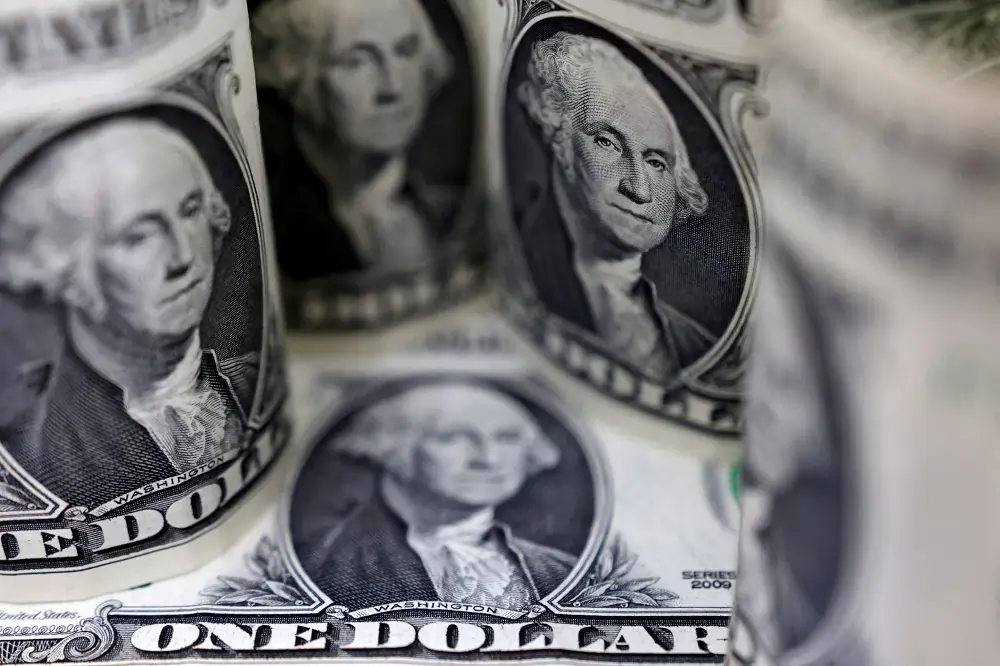
By Samuel Indyk and Kevin Buckland
LONDON (Reuters) -The dollar hovered near a five-week peak against major peers on Thursday after robust U.S. retail sales data added to expectations the Federal Reserve will not rush to lower interest rates.
The U.S. dollar index, which measures the currency against a basket of six rivals, was steady at 103.33 in the European morning, after reaching 103.69 on Wednesday for the first time since Dec. 13.
Traders have trimmed the odds of a first Federal Reserve rate cut by March to 61%, from 65% on Tuesday, according to CME’s FedWatch Tool.
The market is still pricing in around 145 basis points of cuts by the end of the year, even as Fed officials including Governor Christopher Waller this week pushed back against expectations of rapid policy loosening.
“U.S. data has been a mixed bag but yesterday we got a very strong retail sales report indicating that there is no need to be too aggressive on rate cuts,” said Niels Christensen, chief analyst at Nordea.
“Lower rate cut expectations and risk-off sentiment is positive for the dollar,” Christensen added.
The dollar pushed as high as 148.525 yen on Wednesday for the first time since the end of November.
It was last trading 0.2% lower on the day at 147.778 yen. At the end of last week, though, it was as weak as 144.35 yen.
Investors have been steadily pricing out hawkish Bank of Japan wagers, not least due to the devastating New Year’s Day quake in central Japan. The BOJ meets on policy on Monday and Tuesday of next week.
“I think dollar-yen is going to be floating between 145 and even 150 in the near term,” a level last seen in mid-November, said Shoki Omori, chief Japan desk strategist at Mizuho Securities.
Should the BOJ stick to its dovish message next week, and if Fed Chair Jerome Powell strikes a similar posture to Waller at the U.S. central bank’s policy meeting on Jan. 30-31, the dollar could push beyond 150 yen by the start of February, Omori said.
“Japanese officials could start to come in and verbally intervene at any time now” to try and slow the yen’s decline, he added.
The euro was flat at $1.0881. It had bounced from a five-week low of $1.08445 on Wednesday, supported by ECB President Christine Lagarde’s comments to Bloomberg that there would likely be majority support among ECB officials for an interest rate cut in the summer, later than market expectations for a spring cut.
Sterling was up 0.1% at $1.26889, extending gains following a rally on Wednesday after data showed inflation unexpectedly accelerated in December, reinforcing expectations the Bank of England will be slower to cut rates than its peers.
The British currency’s 0.3% jump on Wednesday snapped a three-day decline against the greenback, and limited Wednesday’s gains for the dollar index, of which sterling is a part.
The Australian dollar was little changed at $0.6555, after recovering from losses as steep as 0.4% to $0.65255 earlier when data showed an unexpected drop in employment in December, adding to the case that rates have peaked in the country.
“There’s clearly some technical support around $0.6520 which bears are hesitant to short above,” said Matt Simpson, senior market analyst at City Index.
“Yet the jobs report doesn’t provide any meaningful reason to be long AUD,” he added. “And that means its next directional move remains in the hands of Fed expectations, and therefore the U.S. dollar.”
(Reporting by Samuel Indyk and Kevin Buckland; Editing by Bernadette Baum)


